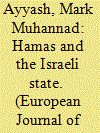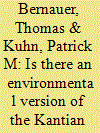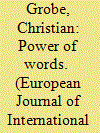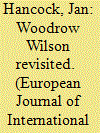| Srl | Item |
| 1 |
ID:
095323


|
|
|
|
|
| Publication |
2010.
|
| Summary/Abstract |
Through an analysis of Hamas's suicide missions and Israel's strategy of 'shock and awe', this article advances a concept of 'violent dialogue.' Drawing on Gadamer's work, as well as some of the points that emerge out of the Gadamer-Derrida encounter, this concept is meant to explicate how acts of political violence create a certain type of communion between those engaged in violent conflict. It will suggest that the appearance of political violent acts does not represent the end of a dialogue between the violent actors, but rather the emergence of a specific form of dialogue under the subject matter of violence. It is argued that this communion takes place outside the intentions of the protagonists, and despite their attempts to separate from each other. This is significant for academic analysis of political violence in general, and for our perspective and outlook on the Israeli-Palestinian conflict in particular.
|
|
|
|
|
|
|
|
|
|
|
|
|
|
|
|
| 2 |
ID:
095322


|
|
|
|
|
| Publication |
2010.
|
| Summary/Abstract |
We examine whether there is an environmental version of the Kantian peace; that is, whether democracies that trade and are bound by international treaties are less likely to harm each other environmentally. Specifically, we study five factors that are likely to help in reducing beggar-thy-neighbour behaviour in terms of transboundary pollution: democracy, supranational institutions, trade relations, stringency of domestic environmental policy and international environmental commitment. The empirical focus is on upstream-downstream water pollution in Europe in 1970-2003. The observed effects of the five variables differ considerably across forms of pollution and definitions of beggar-thy-neighbour behaviour. Some of our explanatory variables contribute to reducing beggar-thy-neighbour behaviour. Hence there is some empirical support for the environmental Kantian argument. Nonetheless, state behaviour in this area remains characterized by free-riding incentives; the forces of democracy, trade and national and international regulation and institutions do not easily produce decent international behaviour.
|
|
|
|
|
|
|
|
|
|
|
|
|
|
|
|
| 3 |
ID:
095319


|
|
|
|
|
| Publication |
2010.
|
| Summary/Abstract |
Throughout the last two decades international negotiations have been predominantly analysed from the perspective of rationalist bargaining theory. But most recently, constructivists have pointed to a different mechanism that may facilitate agreement among multiple parties: processes of argumentation. Indeed, numerous empirical studies were successful in showing that words have the power to change the initial bargaining position of an actor and thereby impact on the outcome of multilateral negotiations. Rationalists have so far been unable to capture this important role of argumentative talk within their conceptual framework. Therefore, this article introduces a theory of rational persuasion, which I call functional persuasion theory. According to this theory argument-based changes in bargaining positions are entirely belief-driven and are not due to a reformulation of agents' preferences, as constructivists hold. The explanatory power of functional persuasion theory is demonstrated in the empirical part of this article by testing it against the most prominent constructivist explanations of argumentative persuasion.
|
|
|
|
|
|
|
|
|
|
|
|
|
|
|
|
| 4 |
ID:
095320


|
|
|
|
|
| Publication |
2010.
|
| Summary/Abstract |
I advance an endogenous explanation for the systemic transformation of international politics and offer to neatly resolve the debate between offensive realism and defensive realism through a social evolutionary approach. I contend that international politics has always been an evolutionary system and it has evolved from an offensive realism world to a defensive realism world. Consequently, offensive realism and defensive realism are appropriate grand theories of international politics for two different historical epochs. Different grand theories of international politics are for different epochs of international politics, and different epochs of international politics actually need different theories of international politics. Because international politics has always been an evolutionary system, non-evolutionary approaches will be intrinsically incapable of shedding light on the evolution of the system. The science of international politics must be a genuine evolutionary science and students of international politics must 'give Darwin his due'.
|
|
|
|
|
|
|
|
|
|
|
|
|
|
|
|
| 5 |
ID:
095324


|
|
|
|
|
| Publication |
2010.
|
| Summary/Abstract |
Counterterrorist state forces and terrorist insurgents compete to control not only territory and populations but language.The success of counterterrorism, therefore, hinges crucially on representational practices. Defeating terrorism in the long run requires both undermining the legitimacy of political violence and its purveyors and opening space for the pursuit of a less violent but still legitimate politics, and these are fundamentally rhetorical projects. Yet the literature has not shed much light on either the range of conceivable counterterrorist representational strategies or on states' particular representational choices.This article presents and illustrates a typology of counterterrorist representational strategies. It argues that state leaders should ideally delegitimize the extremists' means while politicizing some of their aspirations. Leaders often do not pursue this rhetorical path, however, due to the constraints imposed by existing understandings of terrorist organizations and especially by foundational discourses. These arguments are explored empirically through studies of the Indian, Spanish, and Turkish counterterrorist campaigns. The article concludes by extending the framework to clarify why the militarized rhetoric of the so-called 'War on Terror' is counterproductive.
|
|
|
|
|
|
|
|
|
|
|
|
|
|
|
|
| 6 |
ID:
095321


|
|
|
|
|
| Publication |
2010.
|
| Summary/Abstract |
The George W. Bush Administrations presented foreign policy in terms of universal liberal values, including human rights. This has led to a number of scholastic comparisons being drawn with the foreign policy of Woodrow Wilson. This article seeks to contribute to this debate by identifying and accounting for three internal rules common to the human rights discourse expressed by the Wilson and Bush Administrations. Bush is argued to indeed be an inheritor of the Wilsonian legacy but not because the Administrations were characterized by the naive advocacy of idealistic values. Instead, human rights have been discursively co-opted by both Presidents as a technique of governance in the sense of producing reality by insisting on one specific interpretation of identities and intents.
|
|
|
|
|
|
|
|
|
|
|
|
|
|
|
|